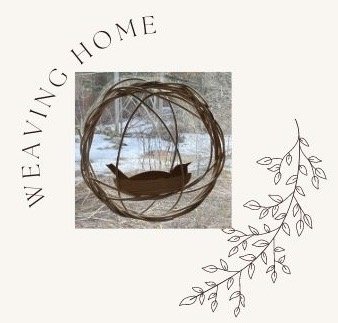“Bono queries, “Why do we need art? Why do we need the lyric poetry of sounds? Because the only way we can approach God is, if we are honest, though metaphor, through symbol. So art becomes essential, not decorative.” (from SDI newsletter, The Psalms with Bono and Eugene Peterson )
Krista Tippet interviewed Elizabeth Gilbert recently on On Being. They were talking about curiosity and creativity. At one point they said that creativity is hard work and mostly boring, you just have to keep slogging though a project, but then there is a moment, like magic, when you get it, you understand what all the mundane work was for and you have a new creation. That is what we found when we wove our prayer bowls, we complained, ‘I can’t do this,’ but we kept going. The starting of any project takes time, and if the start doesn’t go well, we’re invited to begin again. There is a Buddhist teaching about having a beginner’s mind - not having any preconceptions of what something is supposed to be, being open to whatever happens. The Psalms talk about God’s faithfulness which is new every morning. Relaxing into the beginning opened the way for creativity to enter. The beginning leads to the middle where we found we got into a rhythm, our fingers had learned their task and beganto have a will of their own as they deftly twisted and sewed the sheaves of grass coaxing it into a bowl shape.
We learned it’s OK to take breaks, to step away, to let things settle. There are fallow times in our lives when we stop and walk away. It gives us time to get fresh perspective, time to reflect and say, ahah I see where I’m going. A time totake stock, and realize the need to stop. When all this happens without judgment we can experience resting in the space between.
Finishing a project is rewarding. We have the results for our effort. Endings invite us to celebrate the product, and they also invite us to think what is next? How can this be better? How can I begin again?
“God isn’t “out there, “remote from us, but rather “at the tip of my pen, my shovel, my paint brush, my sewing needle…my heart and thoughts,” as Teilhard says.” - (Gabrielle Stoner, a reflection on Teilhard de Chardin in the Mendicant CAC)
++++
What is a prayer bowl used for? Well, it can be a receptacle for those things that are weighing on your heart. Write them down and put them in the bowl and forget them. A prayer bowl can also be used at your prayer time as a focus to hold in your hands as you symbolically placethe desires of your heart within. You can keep the bowl on your home altar to remind you of prayer, contemplation and the day you created it. Even if the bowl doesn’t have a useful purpose, just taking the time to make it, helps us connect with the Eternal, by being present and mindful.
“Presence is experienced in a participative way, not by thinking about it. The mind, by nature, is intent on judging, controlling, and analyzing instead of seeing, tasting, and loving. This is exactly why the mind cannot be present or live in the naked now. The mind wants a job and believes that its job is to process things by its own criteria. The key to stopping this obsessive game is, quite simply, peace, silence, or stillness. Silence is God’s primary language; “everything else is a poor translation,” as Fr. Thomas Keating wisely observes.” - Richard Rohr

